Oral Presentation: Exploring the Big Five Personality Traits Model
VerifiedAdded on 2022/11/14
|7
|809
|257
Presentation
AI Summary
This presentation provides an overview of the Big Five personality traits model, also known as the Five-Factor Model. It explores the five super traits: Openness to Experience, Conscientiousness, Extraversion, Agreeableness, and Neuroticism, as defined by McCrae and Costa. The presentation focuses on the Agreeableness trait, detailing its characteristics (kindness, helpfulness, generosity), sub-traits (sympathy, altruism, honesty, cooperation, hospitality), and implications of high or low levels of agreeableness, as well as how it relates to academic outcomes. It also touches on how personality traits can change over time. The presentation uses the provided sources to support the information.
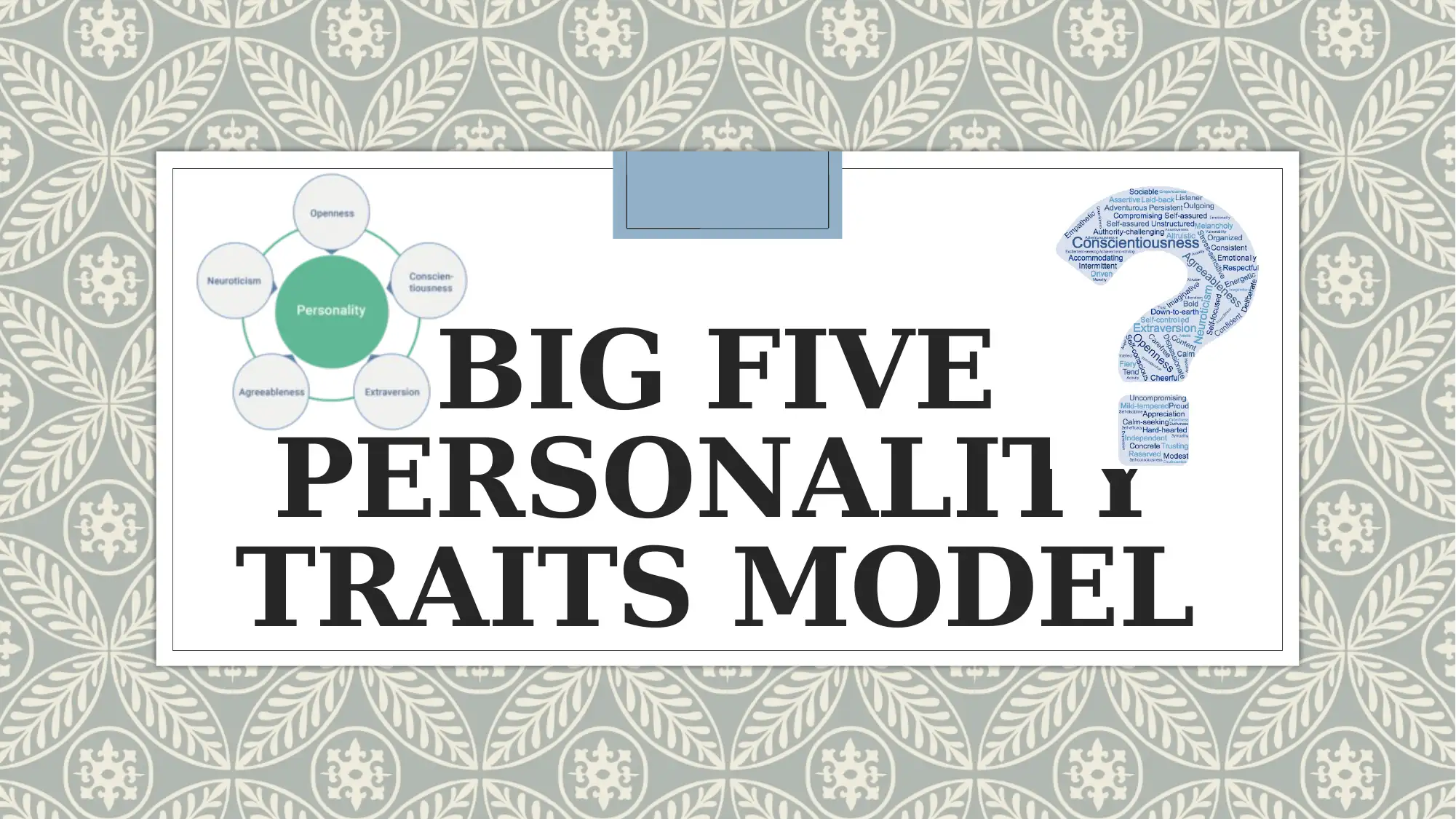
BIG FIVE
PERSONALITY
TRAITS MODEL
PERSONALITY
TRAITS MODEL
Paraphrase This Document
Need a fresh take? Get an instant paraphrase of this document with our AI Paraphraser
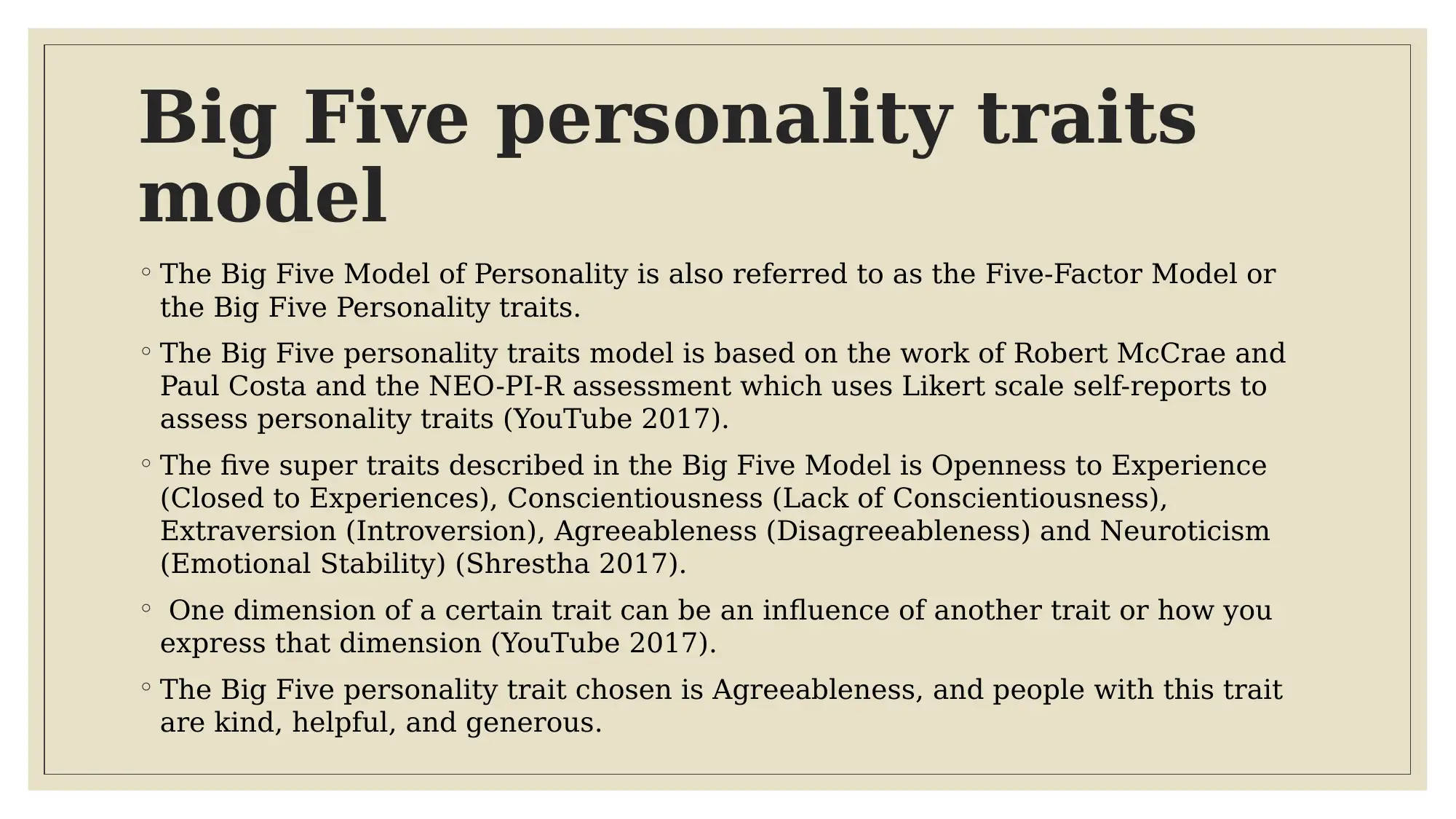
Big Five personality traits
model
◦ The Big Five Model of Personality is also referred to as the Five-Factor Model or
the Big Five Personality traits.
◦ The Big Five personality traits model is based on the work of Robert McCrae and
Paul Costa and the NEO-PI-R assessment which uses Likert scale self-reports to
assess personality traits (YouTube 2017).
◦ The five super traits described in the Big Five Model is Openness to Experience
(Closed to Experiences), Conscientiousness (Lack of Conscientiousness),
Extraversion (Introversion), Agreeableness (Disagreeableness) and Neuroticism
(Emotional Stability) (Shrestha 2017).
◦ One dimension of a certain trait can be an influence of another trait or how you
express that dimension (YouTube 2017).
◦ The Big Five personality trait chosen is Agreeableness, and people with this trait
are kind, helpful, and generous.
model
◦ The Big Five Model of Personality is also referred to as the Five-Factor Model or
the Big Five Personality traits.
◦ The Big Five personality traits model is based on the work of Robert McCrae and
Paul Costa and the NEO-PI-R assessment which uses Likert scale self-reports to
assess personality traits (YouTube 2017).
◦ The five super traits described in the Big Five Model is Openness to Experience
(Closed to Experiences), Conscientiousness (Lack of Conscientiousness),
Extraversion (Introversion), Agreeableness (Disagreeableness) and Neuroticism
(Emotional Stability) (Shrestha 2017).
◦ One dimension of a certain trait can be an influence of another trait or how you
express that dimension (YouTube 2017).
◦ The Big Five personality trait chosen is Agreeableness, and people with this trait
are kind, helpful, and generous.
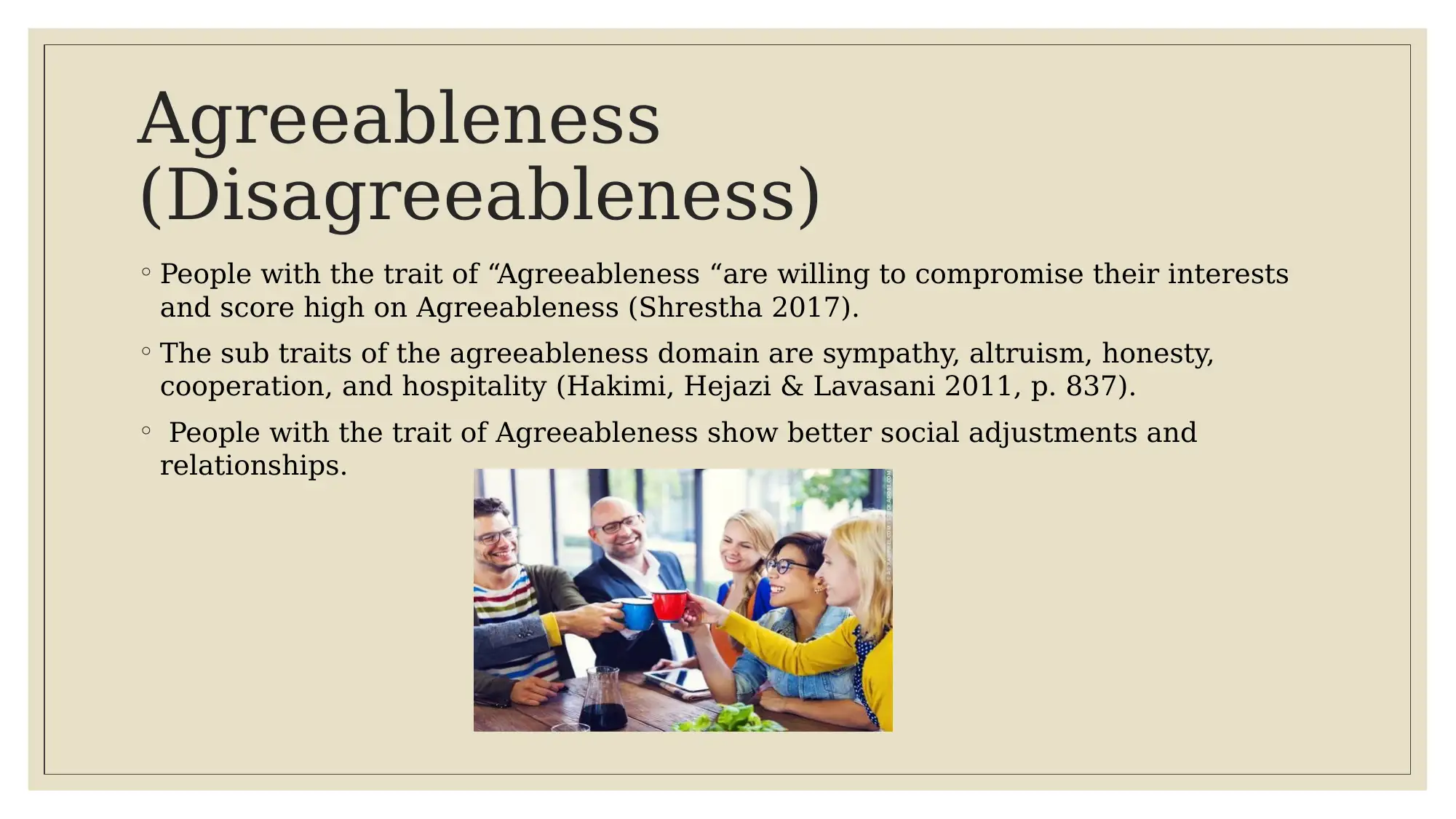
Agreeableness
(Disagreeableness)
◦ People with the trait of “Agreeableness “are willing to compromise their interests
and score high on Agreeableness (Shrestha 2017).
◦ The sub traits of the agreeableness domain are sympathy, altruism, honesty,
cooperation, and hospitality (Hakimi, Hejazi & Lavasani 2011, p. 837).
◦ People with the trait of Agreeableness show better social adjustments and
relationships.
(Disagreeableness)
◦ People with the trait of “Agreeableness “are willing to compromise their interests
and score high on Agreeableness (Shrestha 2017).
◦ The sub traits of the agreeableness domain are sympathy, altruism, honesty,
cooperation, and hospitality (Hakimi, Hejazi & Lavasani 2011, p. 837).
◦ People with the trait of Agreeableness show better social adjustments and
relationships.
⊘ This is a preview!⊘
Do you want full access?
Subscribe today to unlock all pages.

Trusted by 1+ million students worldwide
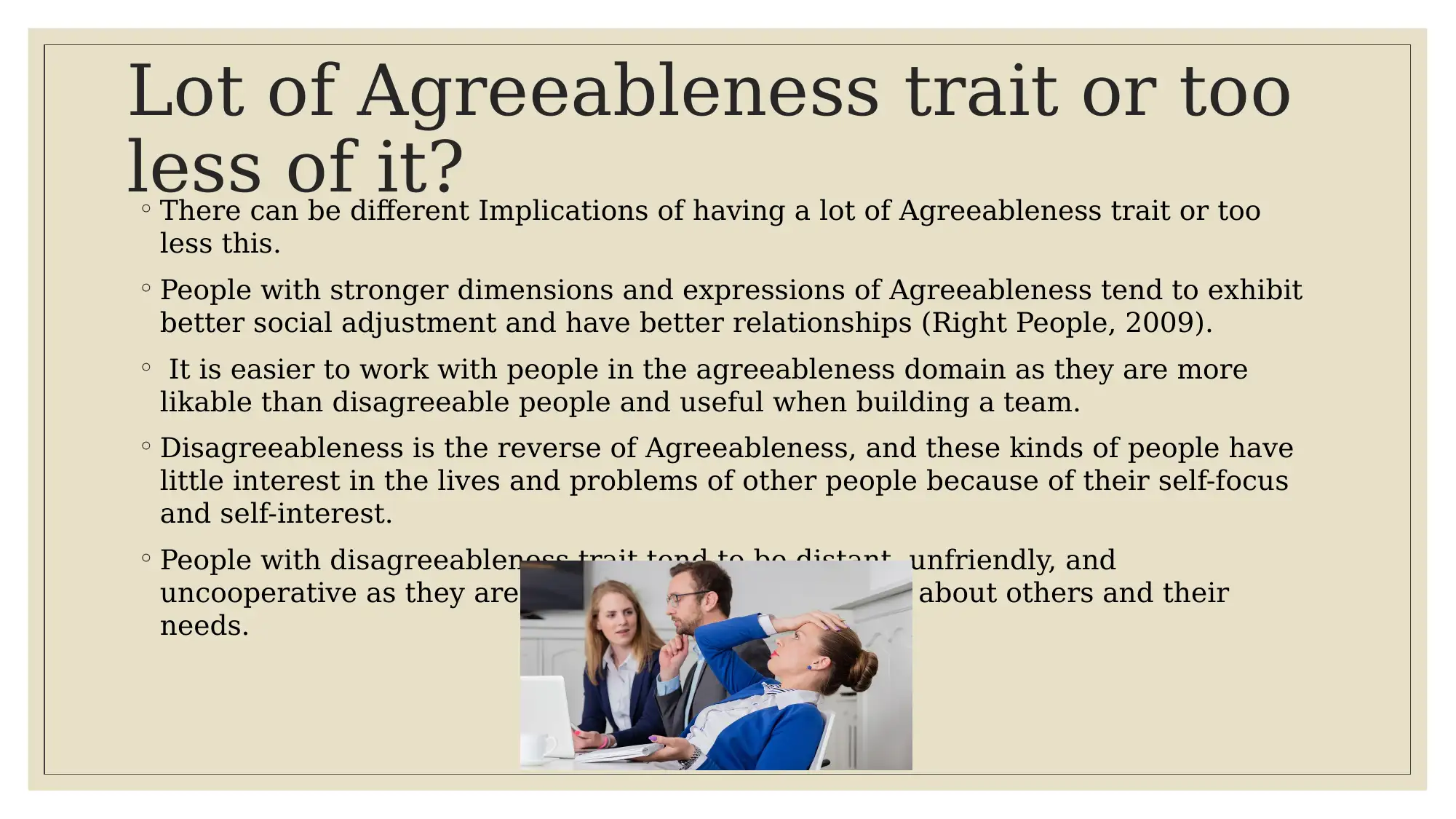
Lot of Agreeableness trait or too
less of it?◦ There can be different Implications of having a lot of Agreeableness trait or too
less this.
◦ People with stronger dimensions and expressions of Agreeableness tend to exhibit
better social adjustment and have better relationships (Right People, 2009).
◦ It is easier to work with people in the agreeableness domain as they are more
likable than disagreeable people and useful when building a team.
◦ Disagreeableness is the reverse of Agreeableness, and these kinds of people have
little interest in the lives and problems of other people because of their self-focus
and self-interest.
◦ People with disagreeableness trait tend to be distant, unfriendly, and
uncooperative as they are self-centered and think less about others and their
needs.
less of it?◦ There can be different Implications of having a lot of Agreeableness trait or too
less this.
◦ People with stronger dimensions and expressions of Agreeableness tend to exhibit
better social adjustment and have better relationships (Right People, 2009).
◦ It is easier to work with people in the agreeableness domain as they are more
likable than disagreeable people and useful when building a team.
◦ Disagreeableness is the reverse of Agreeableness, and these kinds of people have
little interest in the lives and problems of other people because of their self-focus
and self-interest.
◦ People with disagreeableness trait tend to be distant, unfriendly, and
uncooperative as they are self-centered and think less about others and their
needs.
Paraphrase This Document
Need a fresh take? Get an instant paraphrase of this document with our AI Paraphraser
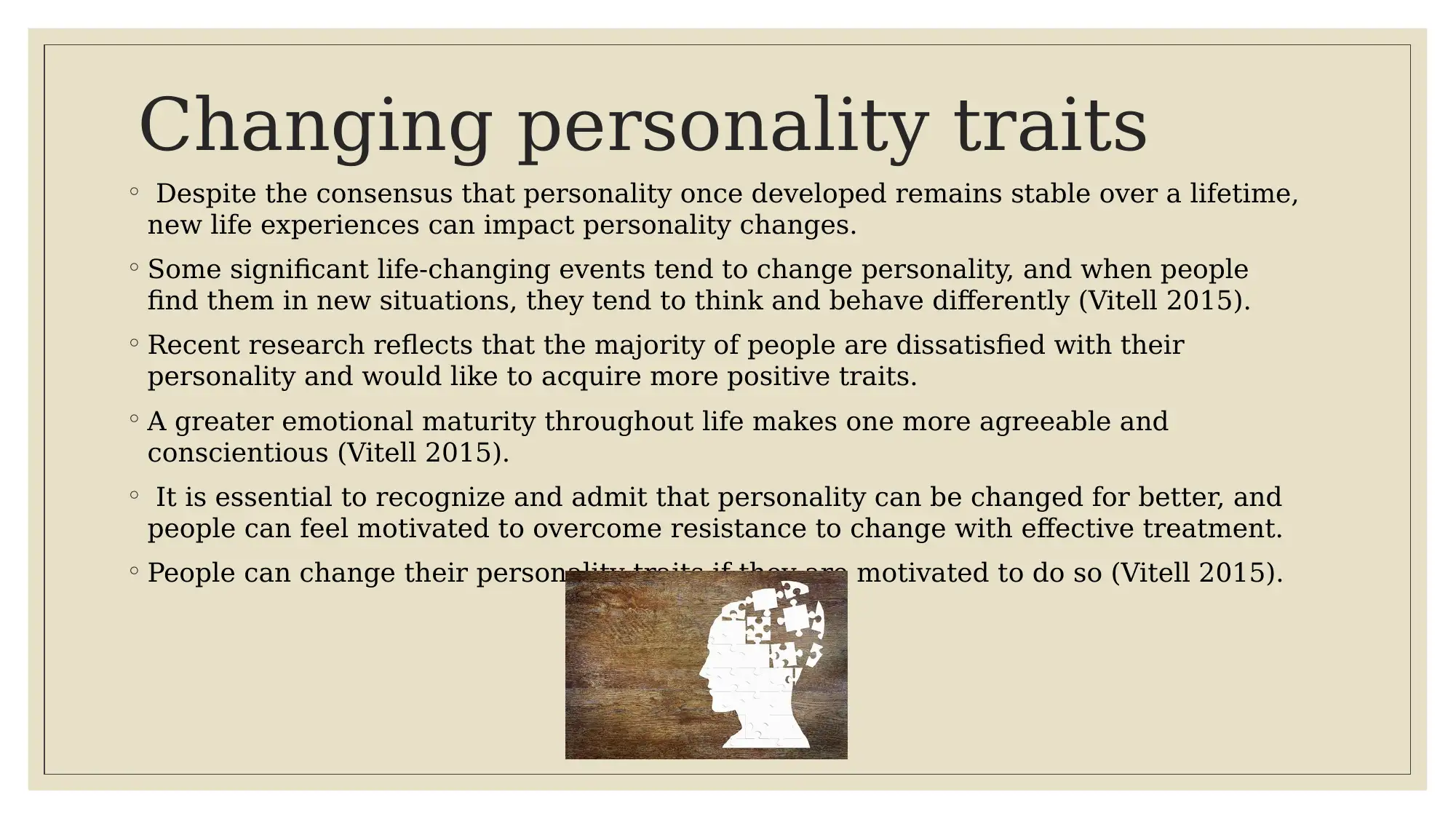
Changing personality traits
◦ Despite the consensus that personality once developed remains stable over a lifetime,
new life experiences can impact personality changes.
◦ Some significant life-changing events tend to change personality, and when people
find them in new situations, they tend to think and behave differently (Vitell 2015).
◦ Recent research reflects that the majority of people are dissatisfied with their
personality and would like to acquire more positive traits.
◦ A greater emotional maturity throughout life makes one more agreeable and
conscientious (Vitell 2015).
◦ It is essential to recognize and admit that personality can be changed for better, and
people can feel motivated to overcome resistance to change with effective treatment.
◦ People can change their personality traits if they are motivated to do so (Vitell 2015).
◦ Despite the consensus that personality once developed remains stable over a lifetime,
new life experiences can impact personality changes.
◦ Some significant life-changing events tend to change personality, and when people
find them in new situations, they tend to think and behave differently (Vitell 2015).
◦ Recent research reflects that the majority of people are dissatisfied with their
personality and would like to acquire more positive traits.
◦ A greater emotional maturity throughout life makes one more agreeable and
conscientious (Vitell 2015).
◦ It is essential to recognize and admit that personality can be changed for better, and
people can feel motivated to overcome resistance to change with effective treatment.
◦ People can change their personality traits if they are motivated to do so (Vitell 2015).
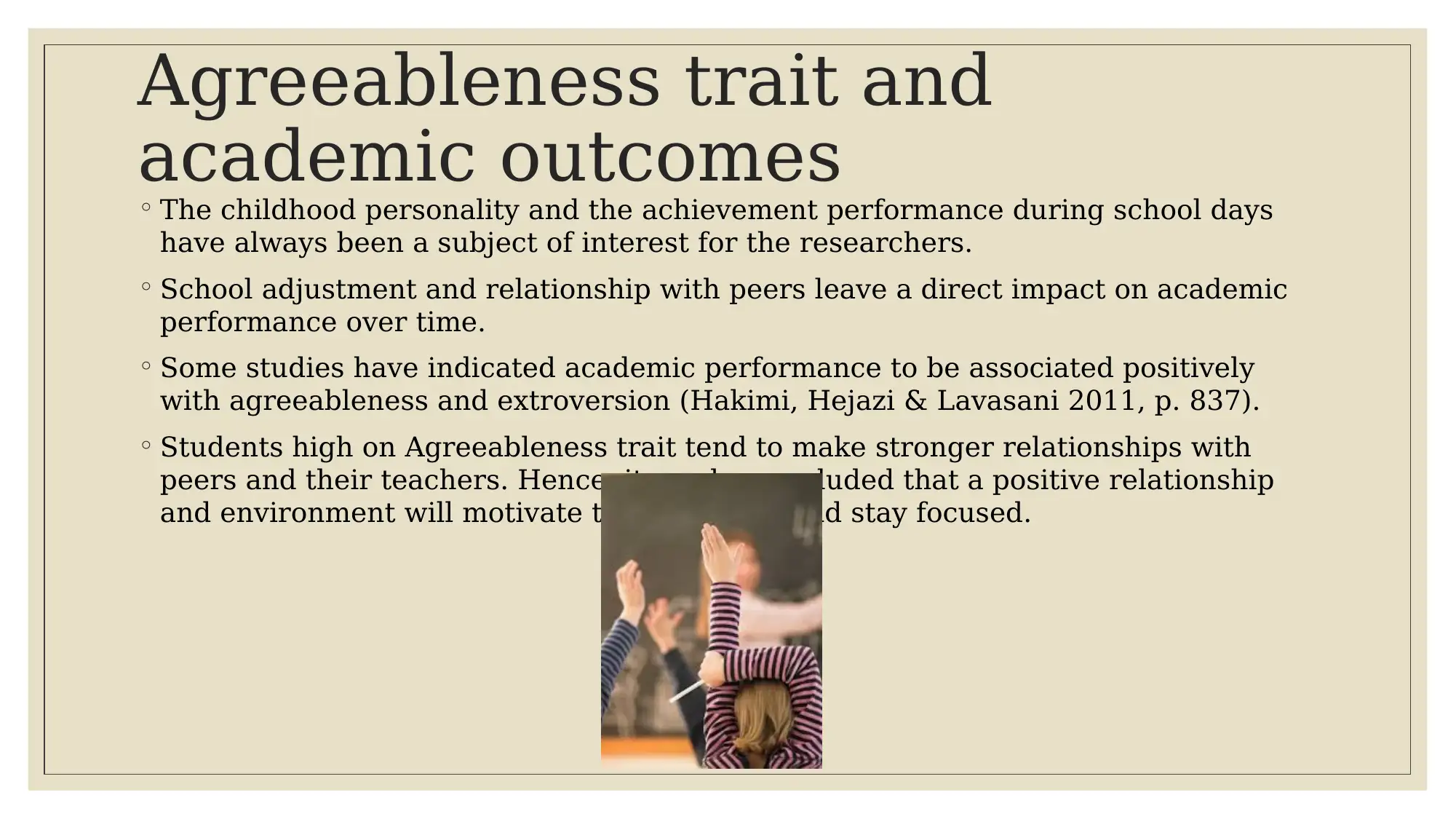
Agreeableness trait and
academic outcomes
◦ The childhood personality and the achievement performance during school days
have always been a subject of interest for the researchers.
◦ School adjustment and relationship with peers leave a direct impact on academic
performance over time.
◦ Some studies have indicated academic performance to be associated positively
with agreeableness and extroversion (Hakimi, Hejazi & Lavasani 2011, p. 837).
◦ Students high on Agreeableness trait tend to make stronger relationships with
peers and their teachers. Hence, it can be concluded that a positive relationship
and environment will motivate them to study and stay focused.
academic outcomes
◦ The childhood personality and the achievement performance during school days
have always been a subject of interest for the researchers.
◦ School adjustment and relationship with peers leave a direct impact on academic
performance over time.
◦ Some studies have indicated academic performance to be associated positively
with agreeableness and extroversion (Hakimi, Hejazi & Lavasani 2011, p. 837).
◦ Students high on Agreeableness trait tend to make stronger relationships with
peers and their teachers. Hence, it can be concluded that a positive relationship
and environment will motivate them to study and stay focused.
⊘ This is a preview!⊘
Do you want full access?
Subscribe today to unlock all pages.

Trusted by 1+ million students worldwide
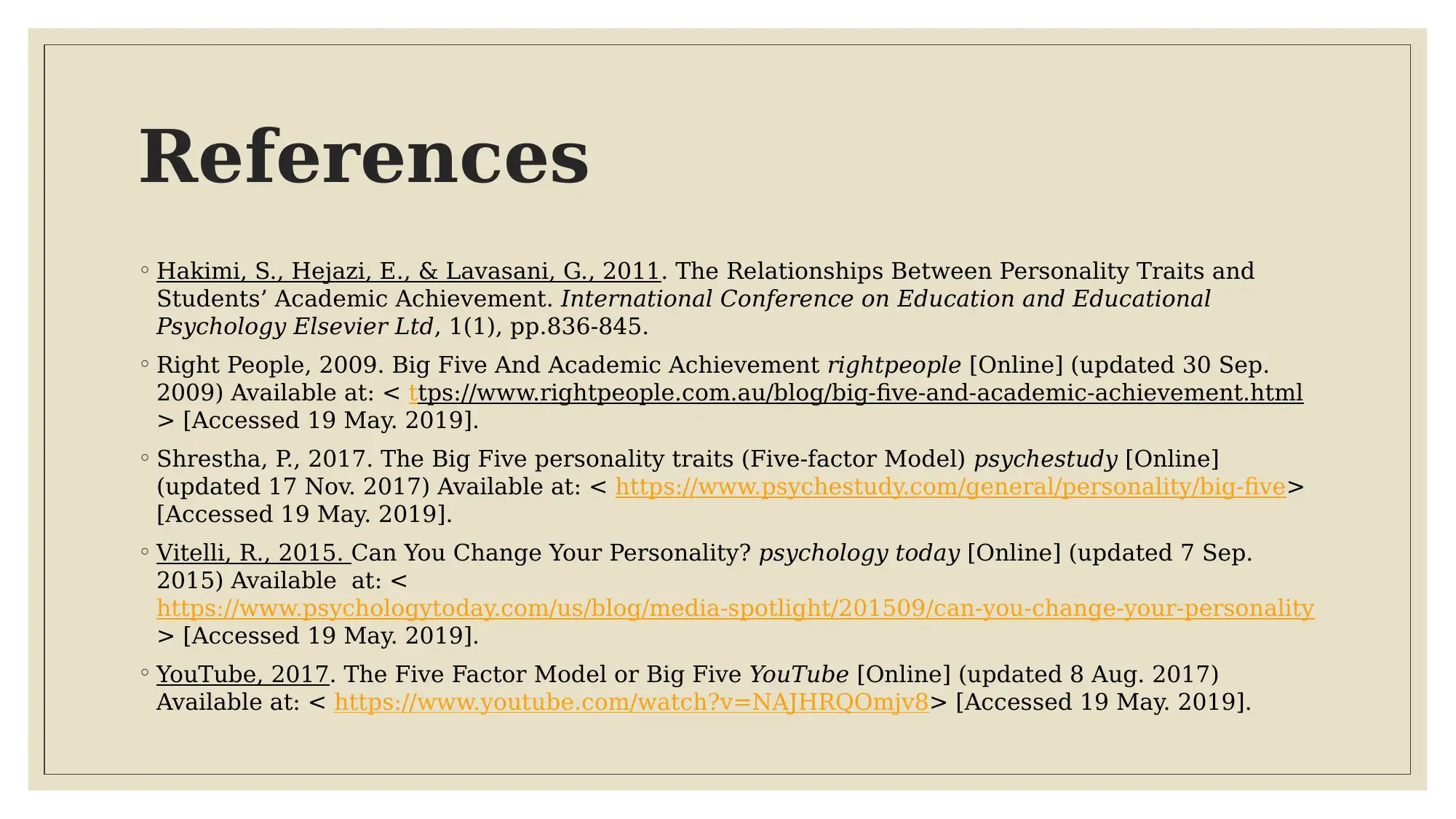
References
◦ Hakimi, S., Hejazi, E., & Lavasani, G., 2011. The Relationships Between Personality Traits and
Students’ Academic Achievement. International Conference on Education and Educational
Psychology Elsevier Ltd, 1(1), pp.836-845.
◦ Right People, 2009. Big Five And Academic Achievement rightpeople [Online] (updated 30 Sep.
2009) Available at: < ttps://www.rightpeople.com.au/blog/big-five-and-academic-achievement.html
> [Accessed 19 May. 2019].
◦ Shrestha, P., 2017. The Big Five personality traits (Five-factor Model) psychestudy [Online]
(updated 17 Nov. 2017) Available at: < https://www.psychestudy.com/general/personality/big-five>
[Accessed 19 May. 2019].
◦ Vitelli, R., 2015. Can You Change Your Personality? psychology today [Online] (updated 7 Sep.
2015) Available at: <
https://www.psychologytoday.com/us/blog/media-spotlight/201509/can-you-change-your-personality
> [Accessed 19 May. 2019].
◦ YouTube, 2017. The Five Factor Model or Big Five YouTube [Online] (updated 8 Aug. 2017)
Available at: < https://www.youtube.com/watch?v=NAJHRQOmjv8> [Accessed 19 May. 2019].
◦ Hakimi, S., Hejazi, E., & Lavasani, G., 2011. The Relationships Between Personality Traits and
Students’ Academic Achievement. International Conference on Education and Educational
Psychology Elsevier Ltd, 1(1), pp.836-845.
◦ Right People, 2009. Big Five And Academic Achievement rightpeople [Online] (updated 30 Sep.
2009) Available at: < ttps://www.rightpeople.com.au/blog/big-five-and-academic-achievement.html
> [Accessed 19 May. 2019].
◦ Shrestha, P., 2017. The Big Five personality traits (Five-factor Model) psychestudy [Online]
(updated 17 Nov. 2017) Available at: < https://www.psychestudy.com/general/personality/big-five>
[Accessed 19 May. 2019].
◦ Vitelli, R., 2015. Can You Change Your Personality? psychology today [Online] (updated 7 Sep.
2015) Available at: <
https://www.psychologytoday.com/us/blog/media-spotlight/201509/can-you-change-your-personality
> [Accessed 19 May. 2019].
◦ YouTube, 2017. The Five Factor Model or Big Five YouTube [Online] (updated 8 Aug. 2017)
Available at: < https://www.youtube.com/watch?v=NAJHRQOmjv8> [Accessed 19 May. 2019].
1 out of 7
Related Documents
Your All-in-One AI-Powered Toolkit for Academic Success.
+13062052269
info@desklib.com
Available 24*7 on WhatsApp / Email
![[object Object]](/_next/static/media/star-bottom.7253800d.svg)
Unlock your academic potential
Copyright © 2020–2026 A2Z Services. All Rights Reserved. Developed and managed by ZUCOL.



